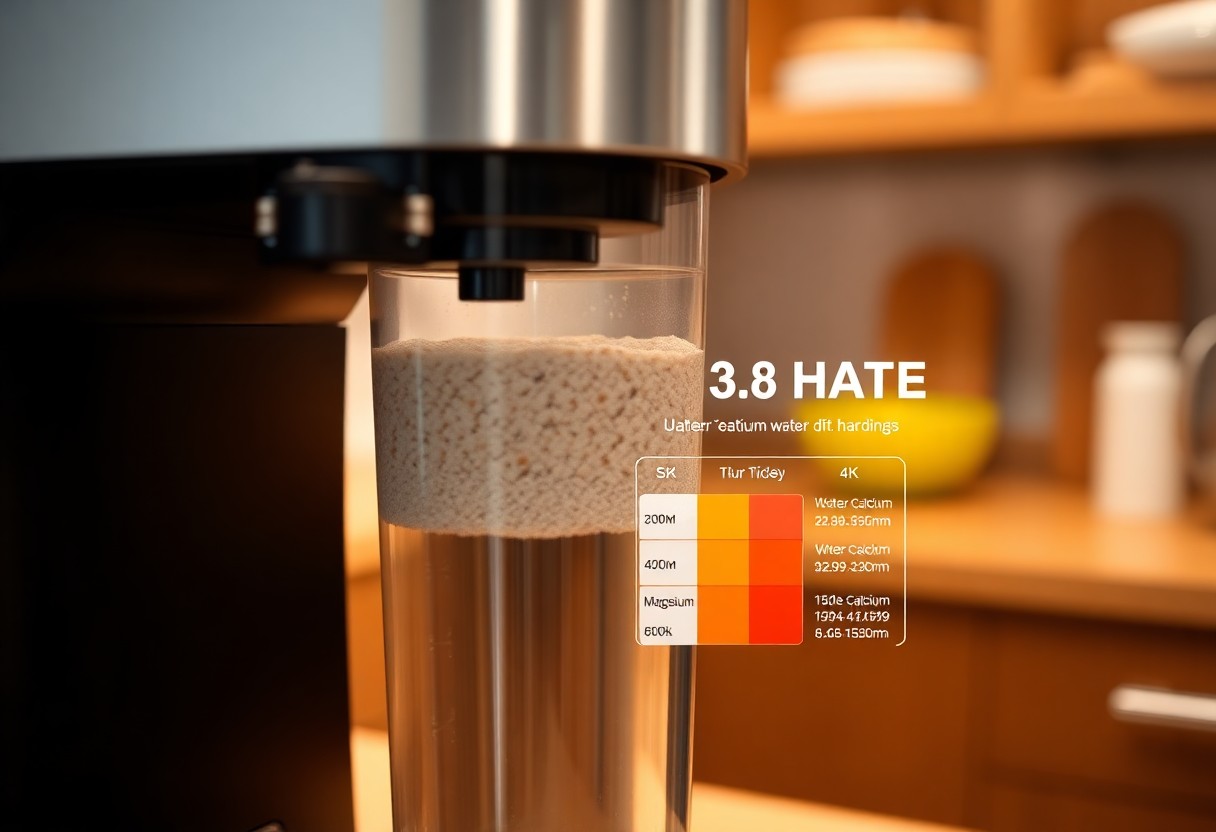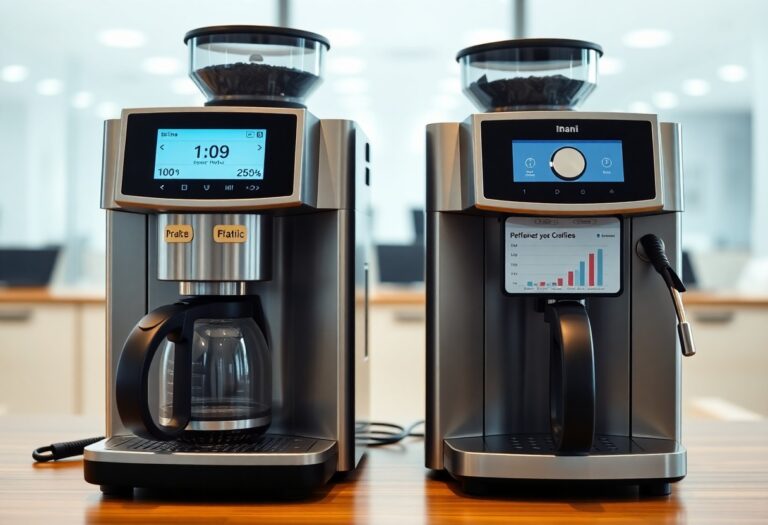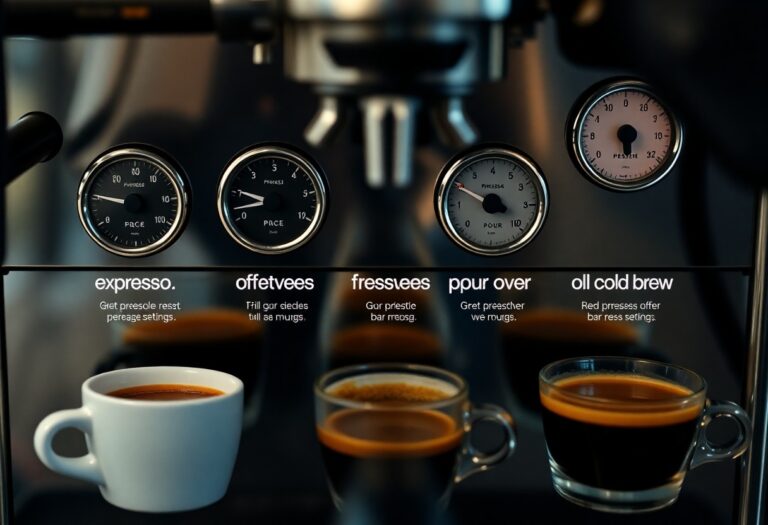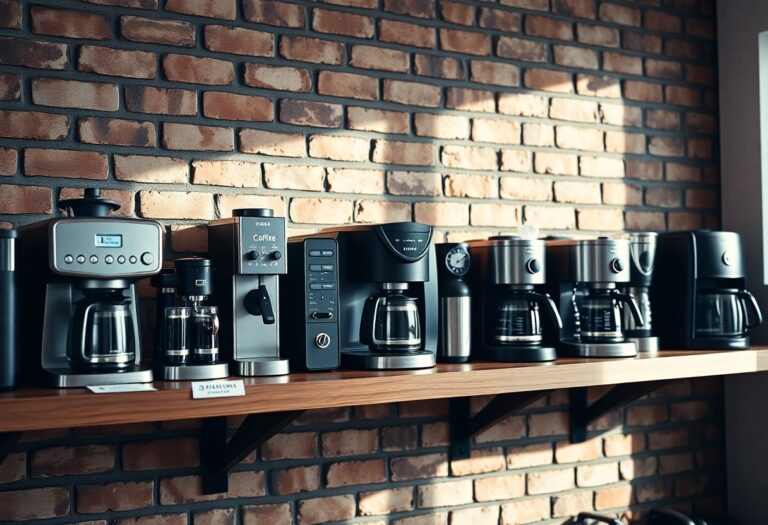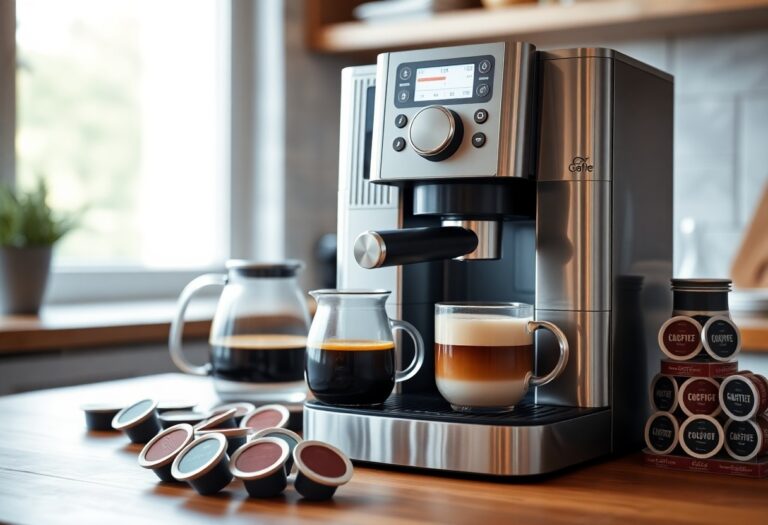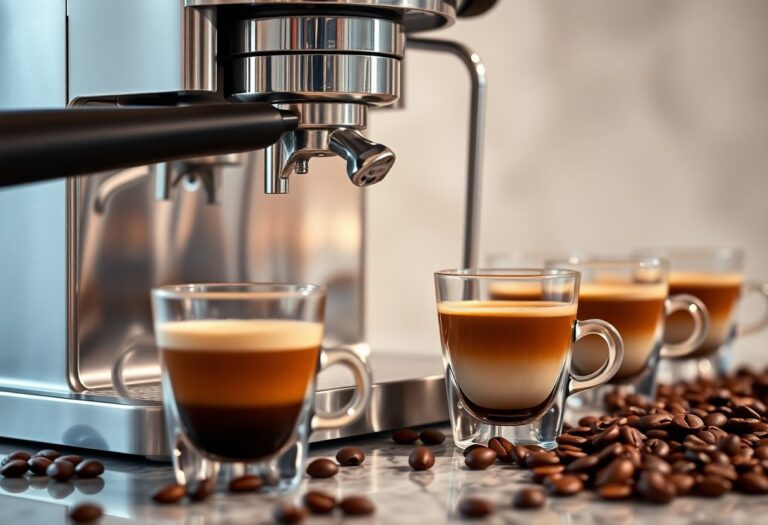What is Water Hardness in a Coffee Machine – Mineral Content
Minerals in your water can significantly impact your coffee brewing experience. Understanding water hardness helps you recognize the mineral content that can affect both the flavor and efficiency of your coffee machine. High mineral levels can lead to scale buildup, compromising your machine’s longevity and performance. On the other hand, a balanced mineral content can enhance the extraction of flavors, resulting in a better cup of coffee. Knowing how to manage your water hardness is important for maintaining your equipment and enjoying quality brews.
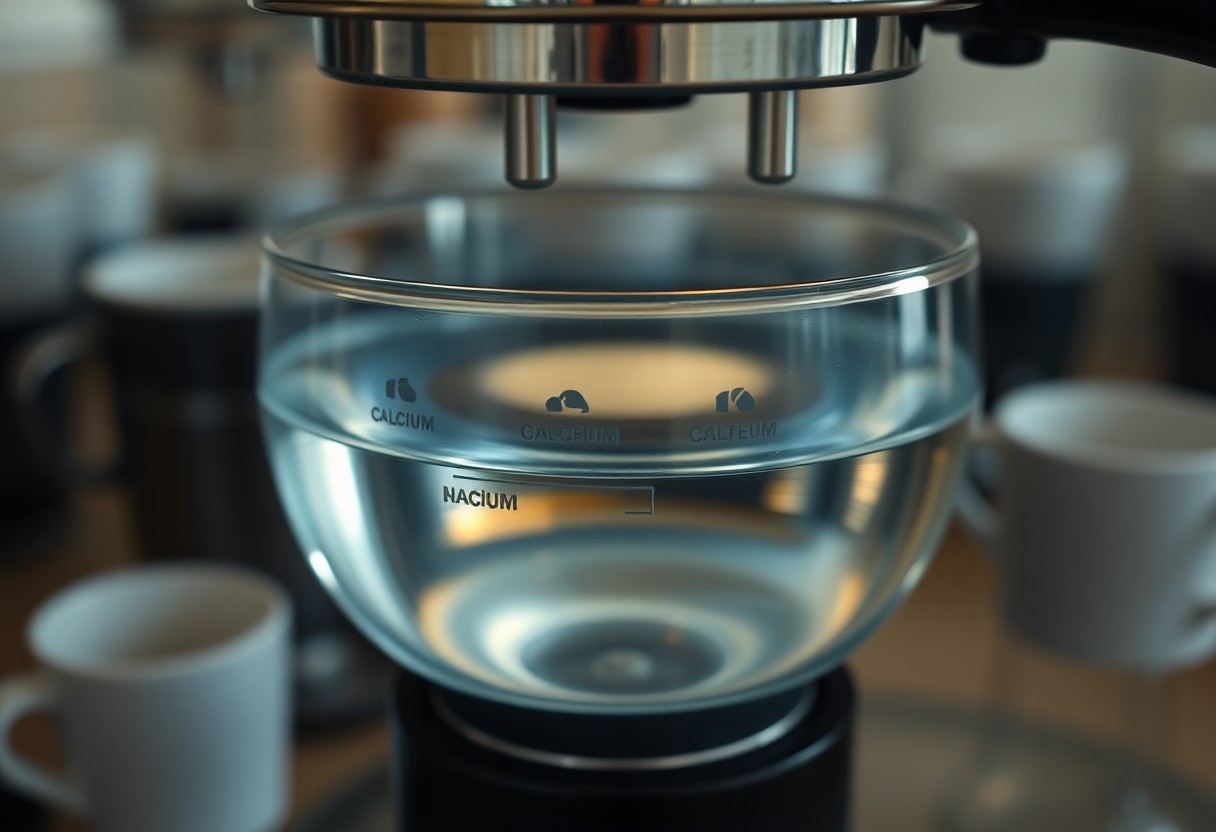
Key Takeaways:
- Water hardness refers to the concentration of minerals, primarily calcium and magnesium, present in water used in coffee machines.
- Water with high hardness levels can lead to scale buildup, affecting the performance and lifespan of the coffee machine.
- Using soft water or water with balanced mineral content can enhance the extraction process, resulting in better flavor and aroma in coffee.
- Regularly testing and monitoring water hardness can help maintain optimal machine operation and coffee quality.
- Many coffee machines come with built-in water filtering systems or recommend compatible filters to manage mineral levels effectively.
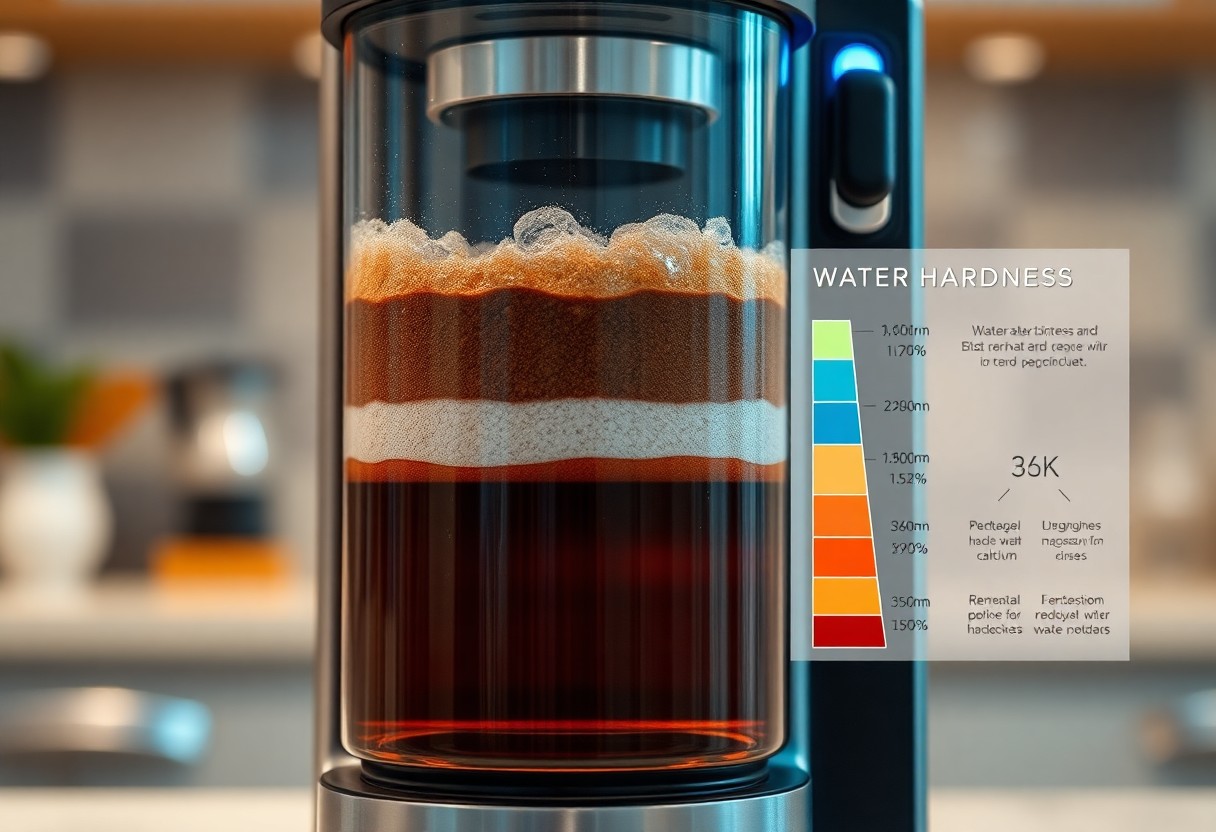
The Science of Water Hardness
Understanding water hardness involves delving into the specific minerals that contribute to its classification. Water hardness is primarily a result of the presence of dissolved minerals in your water supply, chiefly calcium and magnesium. These minerals originate from geological formations and can significantly affect your coffee brewing experience by influencing flavor extraction and equipment longevity.
Defining Water Hardness: A Closer Look at Minerals
Water hardness is typically defined in degrees, where “soft” water contains low concentrations of dissolved minerals, while “hard” water has high levels, often exceeding 180 mg/L of calcium carbonate. Tapping into local water quality reports can give you valuable insights into the mineral content of your water supply, helping you gauge its impact on your coffee machine performance.
The Role of Calcium and Magnesium in Brew Quality
Calcium and magnesium play pivotal roles in the overall quality of your brewed coffee. They enhance the extraction of flavor compounds, contributing to a well-rounded cup. A balanced presence of these minerals can accentuate desired flavors, whereas their absence may lead to flat, lifeless brews. Optimal concentrations typically range around 70-150 mg/L for calcium and 10-30 mg/L for magnesium to achieve the perfect extraction and flavor profile.
In the brewing process, calcium aids in stabilizing the coffee’s acidity while unlocking the aromatic compounds that deliver the nuanced flavors you seek. Magnesium, on the other hand, notably enhances the richness and mouthfeel of the brew, making the drinking experience more pleasurable. When your water has a balanced mix of these minerals, your coffee not only tastes better but also functions as a protective measure against the scale buildup in your machine, ensuring a longer lifespan for your equipment. Regular testing and adjustment of your water’s hardness can yield impressive improvements in your brewing results.
Hard Water’s Impact on Coffee Extraction
The presence of hard water can significantly affect the extraction process of coffee. High mineral content, particularly calcium and magnesium, can lead to over-extraction or uneven flavor profiles. This means the coffee may taste more bitter or astringent due to the prolonged interaction of water with coffee grounds. As you brew, the minerals in hard water can block the flow of water, resulting in an uneven extraction. If you’re concerned about this, consider exploring whether hard water is inherently bad for brewing coffee.
How Minerals Affect Flavor Profiles
The minerals in hard water can enhance or detract from your coffee’s flavor profile. For example, calcium contributes to sweetness, while excessive minerals can create a chalky or harsh aftertaste. Balancing these elements is important to achieving that coveted cup of coffee where flavors harmonize instead of clashing.
The Relationship Between Hardness and Extraction Efficiency
Hard water’s mineral composition directly impacts extraction efficiency. Higher hardness levels may lead to over-extraction, pulling bitter compounds from the coffee grounds instead of the delicate flavors. This can happen because the minerals interact with the coffee’s solubles, affecting how efficiently they dissolve in the brew. Consequently, you might find that your coffee lacks the desired balance and complexity.
When examining extraction efficiency, a study revealed that water containing a moderate level of minerals performs better than both extremely hard and soft waters. Specifically, water hardness around 120-180 mg/L of calcium carbonate was found optimal for extracting rich flavor notes without overwhelming bitterness. Thus, maintaining the right hardness level is important for achieving a nuanced, flavorful cup of coffee. A pivot towards soft water may sound appealing, but it might strip away the very flavors you wish to enhance. Knowing these insights helps refine your brewing practices.
Detrimental Effects on Coffee Machines
Your coffee machine faces several challenges when dealing with hard water. The accumulation of minerals not only interferes with your brews but also shortens the lifespan of your beloved equipment. Ignoring water hardness can lead to costly repairs and replacements, adding unnecessary stress to your daily routine.
Limescale Buildup: The Silent Destroyer
Limescale, a byproduct of hard water, often goes unnoticed until it’s too late. This mineral buildup clogs vital components of your coffee machine, from the heating element to the water lines. Over time, this leads to inefficiencies in brewing and can even cause your machine to break down, leaving you without that morning cup of joe.
Maintenance Costs: When Hard Water Strikes Back
Hard water not only affects the functionality of your coffee machine but also inflates your maintenance costs significantly. Regular descaling treatments can become a routine expense, and in extreme cases, parts may need replacement more often, leading to unexpected bills that can disrupt your budget.
For example, if you were to neglect regular maintenance and experience a severe limescale buildup, the cost of repair could easily exceed several hundred dollars. In contrast, a proactive approach, which includes descaling once every few months, can save you money in the long run. You might opt for specialized descaling solutions, which typically range from $10 to $30 per bottle, depending on the brand and effectiveness. Investing in a water filter or softener can offer an even better solution, costing around $100 to $500 initially but significantly reducing ongoing maintenance costs and machine longevity.
Solutions for Coffee Enthusiasts
Finding ways to manage water hardness not only protects your coffee machine but also enhances your brew quality. By understanding and implementing effective solutions, you can enjoy a better-tasting cup of coffee while safeguarding your equipment from limescale and other mineral build-up. You’ll create an optimal environment for brewing, which can significantly impact overall flavor and aroma.
Softening Techniques: From Filters to Treatments
Utilizing water filtration systems can greatly reduce water hardness, allowing you to enjoy cleaner, brighter flavors in your coffee. Options such as activated carbon filters and reverse osmosis systems effectively remove excess minerals, while ion-exchange softeners can swap out calcium and magnesium ions for sodium. Each method suits different setups and preferences, so consider your coffee habits when selecting the best filter or treatment.
Choosing the Right Equipment for Your Water Source
To combat water hardness effectively, assess your water source and tailor your coffee equipment accordingly. If your tap water is hard, investing in a high-quality water filter can make a substantial difference. Equipment like built-in filtration systems or water-softening attachments work in tandem with your coffee machine. You’ll find options that integrate seamlessly, providing constant filtration as you brew, ensuring each cup is consistently delicious.
Be proactive in matching your coffee machine to your water’s specific mineral profile by checking reviews and testing results. Many coffee enthusiasts specifically choose machines equipped with in-built water filtration systems or compatible filter cartridges due to their convenience and effectiveness. Additionally, consider measuring your water’s hardness regularly, as this data can guide you in selecting the best equipment and products designed for optimal brewing with minimal maintenance. By investing in the right tools, you’ll ensure every cup of coffee reflects the purity of your water source, enhancing your overall coffee experience.
The Broader Implications of Water Quality
Water quality extends beyond your coffee cup; it impacts health, the environment, and local economies. The presence of contaminants can affect not only the taste of your favorite brew but also your health. Poor water quality may contribute to issues like plumbing damage or higher maintenance costs for coffee machines, all of which can add up in the long run. Understanding how water hardness and quality affect these factors enables you to make informed choices that benefit both your coffee enjoyment and broader community health.
Environmental Considerations: The Ripple Effect
Water treatment processes, particularly in regions with high mineral content, can lead to significant energy consumption and pollution. To soften water, salt-based systems often discharge brine into waterways, which can harm aquatic ecosystems. This cycle underscores how your coffee preferences can influence localized environmental degradation due to increased energy use and chemical runoff.
Understanding Local Water Supply Variability
Your local water supply can vary greatly, not only between different regions but also within the same municipality. Factors such as seasonal weather changes, agricultural runoff, and population growth can alter mineral concentrations in the water supply, thus impacting your coffee experience. For instance, during heavy rainfall, you might notice a sudden increase in hardness due to eroded minerals washing into water sources.
The variability of local water supply can create complex challenges for daily coffee drinkers. Across the United States, for example, a city like San Francisco typically has softer water, while nearby areas, such as Los Angeles, may present significantly harder water. Such discrepancies can influence everything from the efficiency of your coffee machine to the overall flavor profile of your drink, indicating the necessity for localized approaches when it comes to water treatment and filtration systems tailored to meet your specific needs.
Conclusion
From above, you can see that understanding water hardness in your coffee machine is crucial for achieving the best flavor and longevity of your equipment. The mineral content in water significantly impacts coffee extraction and machine maintenance, affecting taste and efficiency. By regularly checking and adjusting your water quality, you can enhance your coffee experience and extend the life of your brewing system.
FAQ
Q: What is water hardness in a coffee machine?
A: Water hardness refers to the concentration of dissolved minerals, primarily calcium and magnesium, present in the water used in a coffee machine. Higher mineral content can affect the brewing process, flavor extraction, and the longevity of the machine.
Q: How does water hardness affect coffee flavor?
A: The mineral content in water plays a significant role in extracting flavor compounds from coffee grounds. If the water is too hard, it might lead to over-extraction, resulting in a bitter taste. Conversely, water that is too soft may under-extract, leading to a flat or weak flavor profile.
Q: How can I test the hardness of my water?
A: You can test water hardness using test strips designed for this purpose, which are widely available online or at local stores. These strips change color based on the hardness levels, giving you an indication of the mineral concentration in your water. Alternatively, some municipalities provide water quality reports that include hardness information.
Q: What is the ideal water hardness for brewing coffee?
A: The ideal water hardness for brewing coffee typically falls between 50 to 175 ppm (parts per million). This range provides a balanced mineral content that enhances flavor extraction while minimizing the risk of scale buildup in the coffee machine.
Q: How can I reduce the hardness of water used in my coffee machine?
A: To reduce water hardness, you can use various methods such as water softeners or filtration systems. Additionally, using bottled water with known hardness levels or utilizing descaling solutions periodically can help maintain an appropriate water hardness for optimal coffee brewing.

